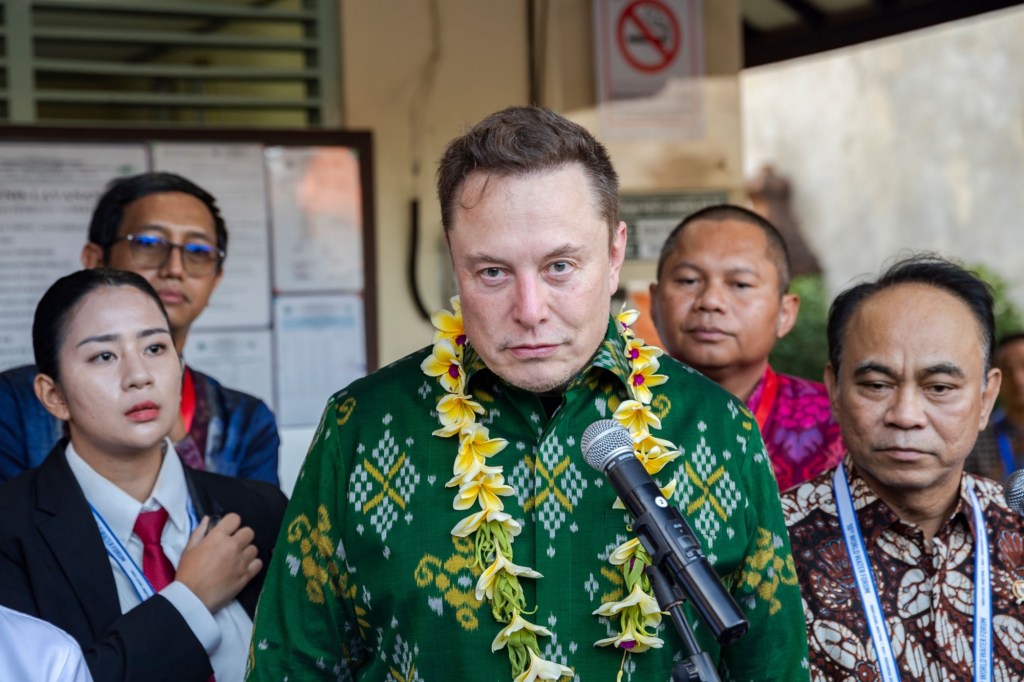Wednesday night, SpaceX and Tesla CEO Elon Musk did that thing he does every so often, which is take wild questions from an audience and answer them as if he’s been thinking about them for years, usually because he has.
Pick a random quote out of a bag and you can turn Musk’s statements at the Recode Code Conference into a piece of news: He wants to put humans on Mars by 2025, said SpaceX is still on track to test the most powerful rocket in the world this year, said Mars isn’t a “bad choice” for a place to die, wants to relaunch a used Falcon 9 rocket in a few months, said we’re already cyborgs, discussed why a direct democracy would be the best political system for a Mars colony and then went into specifics of how that democracy would work, etc.
Videos by VICE
Depending on the question, the resulting discussions are ones philosophy or engineering students have probably had while they’re flying high on an illicit substance. Most of the stuff he brought up we’ve already explored a bit here in Motherboard’s digital pages. But, because Musk has made rockets that can land themselves, cars that can drive themselves, and is actively working on moving humans off of the planet Earth, well, everything he says has a heft to it that you don’t automatically get simply by smoking weed.
My favorite segment from last night’s chat is probably the most Motherboardy of them all. Musk said he thinks there’s a “one in billions” chance that we’re not living in a computer simulation right now, meaning Musk is a firm believer in the hypothesis that a super intelligent artificial intelligence created the universe as we know it.
“There’s a one in billions chance we’re in base reality”
“The strongest argument for us being in a simulation, probably being in a simulation is the following: 40 years ago, we had pong, two rectangles and a dot,” Musk said. “That is what games were. Now 40 years later we have photorealistic 3D simulations with millions of people playing simultaneously and it’s getting better every year. And soon we’ll have virtual reality, augmented reality, if you assume any rate of improvement at all, the games will become indistinguishable from reality.”
Radio Motherboard is available on all podcasting apps and iTunes.
We’ve done a few feature articles on the simulated universe hypothesis, which was initially spelled out by British philosopher Nicholas Bostrom in 2003. The hypothesis allows for three plausible explanations for the nature of the universe, as Bostrom was kind enough to explain to us for the Radio Motherboard podcast last year. According to the hypothesis, one of the following three cases is true:
- We’re literally living in a computer simulation
- There is a strong aversion in advanced civilizations to making “ancestor simulations”—that is, highly evolved civilizations have no interest in making what are essentially video games of their past
- Something destroys all civilizations before they’re able to advance to the point where they are technologically capable of simulating consciousness
As former Motherboard writer Maddie Stone wrote in an article about a related hypothesis, there is increasing evidence that our universe is a hologram which suggests physics may have quirks we don’t yet comprehend or that the creation of the universe may be the work of super intelligence. There’s also increasing interest in the scientific community about finding out the nature of reality: The Department of Energy’s Fermilab is currently conducting some of the first-ever experiments to determine whether or not we’re living in a hologram, though early results have been inconclusive.
Musk strongly believes that, of Bostrom’s three possibilities, the first one is correct. He says that because we’re already creating simulations of everything—I mean, we have Ikea furniture assembly simulators for goodness sake—and computing power is ever-increasing, we’ll eventually have the ability to create simulated realities.
“Even if the rate [of technological advancement] drops by a thousand from right now—imagine it’s 10,000 years in the future, which is nothing in the evolutionary scale. So given we’re clearly on a trajectory to have games that are indistinguishable from reality and those games could be played on a set top box or on a PC or whatever and there would be billions of such computers or set top boxes, it would seem to follow the odds we’re in base reality is one in billions,” Musk said. “Tell me what’s wrong with that argument. Is there a flaw in that argument?”
Musk said that of Bostrom’s possibilities, the simulation one is the most palatable; the other ones are actually slightly more bleak than the idea that reality isn’t real.
“There’s a one in billions chance [we’re in] base reality,” he said. “I think it’s one in billions. We should hope that’s true because otherwise if civilization stops advancing, that could be due to some calamitous event that erases civilization, so maybe we should be hopeful this is a simulation. Otherwise, we will create simulations that are indistinguishable from reality or civilization will cease to exist. Those are the two options.”
Why should the average person care about the nature of reality? Well, it’s one of those existential questions both mind-blowing and actually makes a lot of sense when you think about it. And as I mentioned before, great to talk about at the bar or with some mind-expanding substances. Just uhh, don’t bring it up during potential romantic encounters:
“I’ve had so many simulation discussions it’s crazy,” Musk said. “It got to the point where every discussion was the AI or simulation conversation and my brother and I finally agreed we would ban such conversations if we were ever in a hot tub because it really kills the magic.”
More
From VICE
-

Screenshot: YouTube/Real Time with Bill Maher -

Christian Filardo -

Photo by Dave Benett/Getty Images for Annabel's -

Elon Musk discussing Starlink in Indonesia. Photo by MADE NAGI/EPA-EFE/Shutterstock.